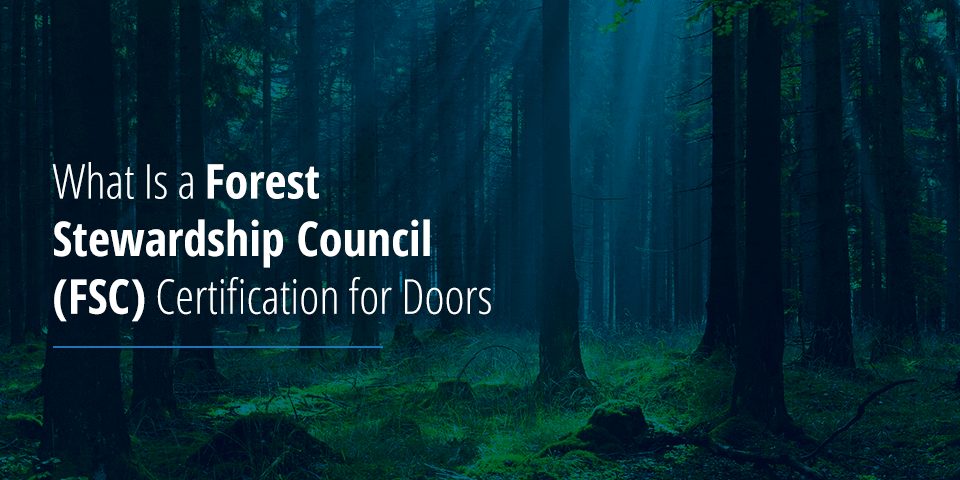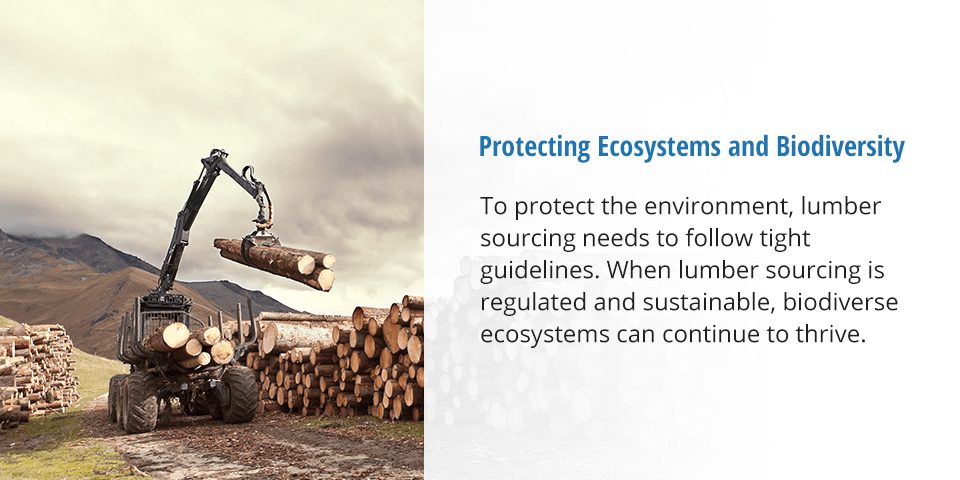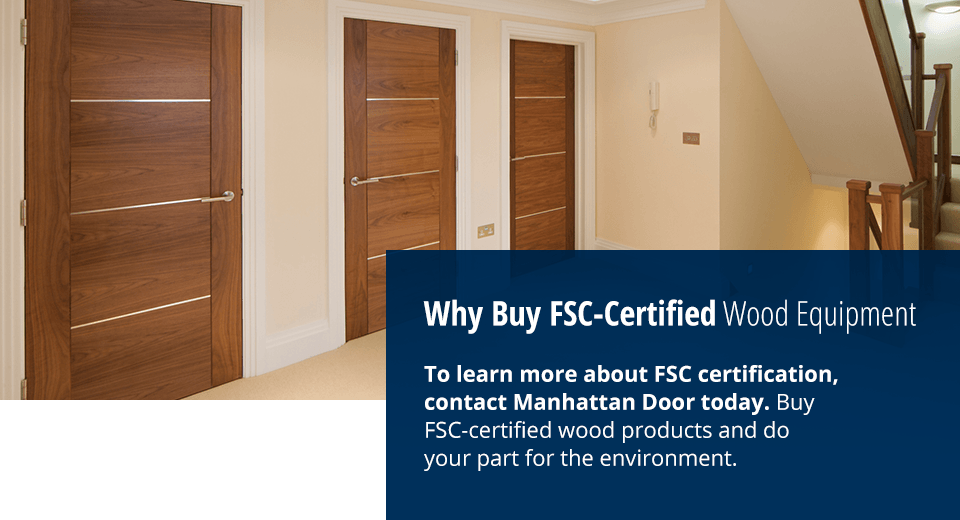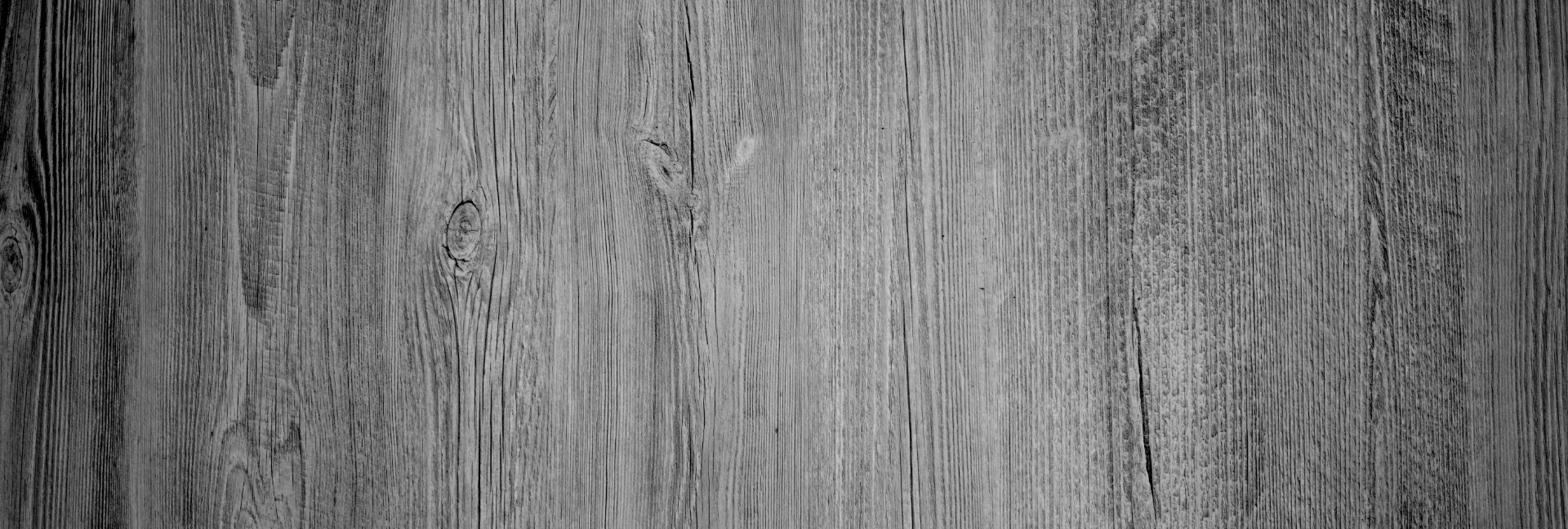



Forest Stewardship Council (FSC) certifies companies that comply with strict standards for the sustainable use of forests. Only compliant companies can apply FSC labels to their products. Following FSC standards and policies helps to protect Earth’s forests and Indigenous people — an increasingly important factor for consumers.
The Manhattan Door is an example of one such company. Many of our Manhattan Door collections are FSC-certified. Learn more about FSC certification — what it means and why it matters.
Want an FSC-certified door? Ask our team about options!
The FSC is a non-profit organization promoting the responsible management of forests. The FSC supports the sustainable use, conservation and restoration of forests worldwide. When a wood product has an “FSC-certified” label, this means the wood and its manufacturer met the FSC standards for sustainable and societally beneficial forest use.
With its mission to protect Earth’s forests, the FSC has become an authority in sustainable lumber-using practices. Setting standards for the sustainable use of forests is an important way to combat deforestation. Forests are important to humans and other animals alike — they purify water, absorb carbon dioxide and support biodiversity. Agriculture, urban development and illegal logging are among the biggest threats to the world’s forests, according to the World Wildlife Fund.
When a company is FSC-certified, the consumer can rest assured they are not contributing to unsustainable deforestation. People are growing more concerned about the environment. In 2022, two-thirds of Americans surveyed adults said the U.S. should focus efforts on developing alternative energy sources. In the same study, two-thirds of adults also said they believe companies’ efforts to limit climate change are insufficient.
Such environmentally-friendly certifications are growing more important to consumers. These accreditations support the viability and development of forests and biological diversity for the future. To keep up with consumer expectations, companies need to seek manufacturers with FSC certifications.
An FSC certification means a manufacturer follows a strict set of FSC criteria. These criteria protect both lumber sourcing forests and the communities of people living in and around those forests. Some of the standards a manufacturer has to meet include:
Responsible forest management is multifaceted. Some of the factors defining responsible forest management include:

Mindless deforestation and irresponsible lumbering practices can destroy ecosystems. Trees provide habitat, shelter, food, water and temperature regulation for many animals. Without forests, many species are unable to survive. More than 70% of land animals and plant species live in forests. Biodiversity keeps Earth in balance — we may not even know all the wide-reaching effects of lost biodiversity. Additionally, forests absorb carbon dioxide and regulate the water cycle, so they help sustain a stable climate.
To protect the environment, lumber sourcing needs to follow tight guidelines. When lumber sourcing is regulated and sustainable, biodiverse ecosystems can continue to thrive. Control helps shape a culture of sustainability where trees grow to supply consumers with resources and companies do their part to continue the cycle. These efforts include long-term management of regrowing forests and using safer harvesting methods to meet demand while keeping the forests healthy for years.
Many Indigenous groups rely on forests for survival and culture. As deforestation kills off species, it also threatens the Indigenous people who rely on those species. While those in developed, industrialized parts of the world will eventually feel the consequences of deforestation, the impact is much more immediate for Indigenous groups.
Sometimes, governments attempt to evict Indigenous people before deforestation begins, leaving these people without a home. An important part of the FSC’s objective is to protect and advocate for Indigenous people. An FSC 100% label shows an effort to protect Indigenous people.
An FSC label indicates legally obtained lumber. This information is crucial — no matter how many regulations are established, they are meaningless if manufacturers source lumber illegally. Does your lumber come from illegal deforestation? Or does your lumber originate from old-growth forests that are rare and highly valuable? FSC highlights the importance of environmental protection by setting forest management guidelines and prohibitions.
Clear-cutting refers to the harvesting of almost all trees in an area. It can degrade or permanently change an environment, so many conservationists oppose any form of clear-cutting. Forest management laws restrict clear-cutting.
Another issue is pesticide use, which we know can be hazardous to many species. Forest management laws also limit the types and amount of pesticides acceptable during lumber sourcing. One high-risk pesticide that poses risks to plants and animals is atrazine. This chlorinated herbicide is widely used in the U.S. despite being banned in European countries and other countries. As part of FSC’s quest to help forests thrive for future generations, they restrict the usage of atrazine.
Different FSC labels have different meanings. Understand the various types of FSC certification, and know what labels to look for. An FSC-certified product can have one of the following three labels:
This label means all materials in the product come from forests meeting all FSC standards. This is the highest level of certification the FSC provides. If a product has an FSC 100% label, you and the consumer can rest assured knowing the product and manufacturer have met numerous strict standards.
The sourcing of the product has contributed to environmentally sustainable and socially beneficial forest conservation efforts. This label shows a commitment to helping the FSC meet its objectives. Look for this label on all wood products.
An FSC Recycled label indicates a product made from 100% recycled material. Using recycled material cuts back on lumber sourcing, which helps to limit deforestation. Recycled wood products have a positive impact on the environment as they decrease the demand for raw materials.
When you see an FSC Mixed label, this means a product is comprised of a mixture of material from FSC-certified forests, recycled material or FSC-controlled wood. FSC-controlled wood does not come from an FSC-certified forest, but it has a decreased risk of coming from an unacceptable source. For this reason, an FSC Mixed label may be less prestigious but is still important to note.
All FSC labels are dark green and show a tree and checkmark illustration. Below the FSC logo and website address, a label will read either “RECYCLED” “100%” or “MIX,” with a short descriptor of the label’s meaning. Look for these labels on all wood products you buy. When you purchase uncertified products, you may unknowingly contribute to deforestation and irresponsible lumber-obtaining practices.

Buying wood products with FSC certification helps protect the environment and human culture. Additionally, supplying certified sustainable products will set you above competitors — average consumers care more and more about the environmental sustainability of their purchases. With an FSC badge on your products, you commit to the conservation of trees and help consumers contribute to ecological forestry in simple ways.
At Manhattan Door, we provide you with options that help promote a cycle that meets the current demands without compromising the forest and the ecosystems. You can order FSC-certified Manhattan Door products and do your part for the environment. To learn more about FSC certification and FSC doors, contact Manhattan Door today.
